Peace

Afghanistan is one of the most desperate, beat up places in the world. Forbes magazine has called it the most dangerous nation on earth. Over 30 years of war have left 2 million people dead, and much of the country in chaos. But even in the most troubled places on earth, there always seems to be a little group of people who refuse to accept the world as it is and insist on building the world they dream of, a little group of people who believe despite the evidence and watch the evidence change.
A few years ago, I began to hear about a little group of young people in Afghanistan doing exactly that. Many of them had seen their loved ones, friends and family killed. They were tired of blood. Tired of war. And so they began to organize, and educate, and train themselves for peace. They studied the heroes of nonviolence, Gandhi and King. A few of them even travelled to India to learn nonviolence and community from Gandhi’s ashram. Now they have their own ashram in Kabul, where dozens of them live together and work for peace.
And they have begun to build a movement: marching in the streets, planting trees, building parks as monuments of peace. They started wearing blue scarves as a symbolic reminder that there is one blue sky that connects us all, and now their little movement is catching the world’s attention. It is a movement of friends without borders.
The motto of their movement is this: “A little bit of love is stronger than all the weapons in the world.”
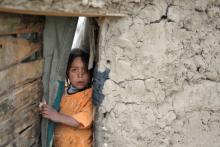
We call upon the United Nations to negotiate an immediate cease-fire to the war in Afghanistan, and to start talks aimed at ending the war and beginning the long road to healing and recovery.
That’s what the Afghan youth said on Tuesday afternoon in Kabul, along with Nobel Peace Prize winner Mairead Maguire of Ireland, as they launched their “Two Million Friends for Afghanistan” campaign and presented their petition to a senior United Nations official.
For me, it was the climax of a heart-breaking, astonishing eight days in one of the poorest, most violent, most war-torn, most corrupt, and most polluted places on the planet — and because of the amazing “Afghan Peace Volunteers,” the 25 Afghan youth who live and work together in a community of peace and nonviolence — one of the most hopeful.

In the church where I grew up, the first Sunday in Advent was dubbed the “hanging of the greens.” On that special Sunday, we sang carols in the decorated sanctuary, all culminating in the children’s live nativity scene. The service never changed from year to year. The only variables were how many kids needed roles and which young child would get stage fright, thus leaving part of the the story without visual representation.
It always seemed like the doves were cursed. The doves rarely remained on stage for the entire performance. Over the years, I was a variety of animals — a wise man, a shepherd, and finally Joseph. I never got stage fright. I was never a dove. I can only imagine what my mother would’ve done if I had been that kid.
It took me years to realize that there was a character missing from my congregation’s telling of the story. We always left out King Herod.
This was a huge oversight, because Herod plays a major role in Matthew’s account of Jesus’ birth.
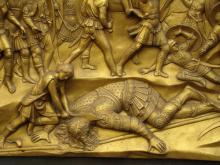
Israel reported last week that it successfully tested its latest missile defense system. Known as “David’s Sling,” it is designed to shoot down midrange missiles from Hezbollah rockets originating from Lebanon.
I don’t want to get bogged down in a discussion about Israel’s right to defend itself. What I want to do is explore the biblical reference to “David’s Sling” and what it might mean for us. The name is an obvious allusion to the story of David’s victory over Goliath. It’s a favorite biblical story for many Sunday school teachers, but a conundrum for those teachers who take mimetic theory seriously. Mimetic theory claims that violence belongs to humans, not to God. It also states that the Bible progressively reveals this message about violence to us. And yet, the connection between God and violence permeates the Bible, with God apparently sanctioning violence against God’s enemies.
So we rightly ask, “What about all the violence in the Bible?”

As I write, I'm stuck in the Central Wisconsin Airport (near the bustling metropolis of Wausau, Wis., for those keeping score at home). And, you guessed it, I'm waiting. Fog in Minneapolis prevented our plane from landing there, and now I'm left sitting in a very small regional airport with no restaurant and no coffee and no concrete sense of what the rest of my day will look like as I make my way to California. All I can do is wait.
I do know, barring something entirely unexpected, that I'll eventually make it to San Francisco. Right now I'm living the axiom offered by Tom Petty decades ago: "The Waiting is the Hardest Part."
Advent, a season during which Christians honor and attempt to approximate the longing for a Messiah more than 2,000 years ago, is often described as a chance to exercise our patience muscles. Advent can serve as a season of anticipation and hope and longing, void of desperation. This is Advent for those who already have most of that for which they wait. But for countless people around the globe, every additional day of waiting comes with a heavy price.
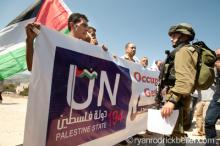
On Nov. 29, Palestinians will bid to become a “non-member observer state” in the United Nations. If approved, this would be a major step toward full statehood for Palestinians. Israel, and perhaps more important, the United States, are against this move, not least for fear of possible war-crime investigations against Israel. Israel’s rationale has always been that a final resolution cannot be achieved unilaterally, but only through direct negotiations. Ironically, Israel achieved its own independence unilaterally and through the United Nations.
Palestinian Christians leaders have sent a strong message of support for this step. A statement signed by 100 community leader says:
We believe the Palestine Liberation Organization’s initiative to enhance Palestine’s status in the United Nations to an Observer State is a positive, collective, and moral step that will get us closer to freedom. This is a step in the right direction for the cause of a just peace in the region. We fully endorse this bid, just as we supported Palestine’s application for full membership of the United Nations a year ago.
IT'S BEEN ALMOST 45 years since nine Catholic peace activists entered a draft board in Catonsville, Md., filled two wastebaskets with military draft files, and burned the papers in a parking lot. What made the headlines especially big was the involvement of two Catholic priests, Daniel and Philip Berrigan.
For many people, me among them, the Catonsville raid was a turning point in our lives. It also triggered passionate debate about the limits of peaceful protest. Could property destruction be called nonviolent?
The prime movers of the Catonsville Nine were Phil Berrigan and George Mische. Mische had worked for U.S.-funded groups fostering labor movements in the Caribbean and Latin America. Phil had fought as an infantryman in World War II, where his courage won him a battlefield commission. Dismayed that the peace movement was having no discernible impact on events in Vietnam, Berrigan became convinced of "the uselessness of legitimate dissent." He opted for firing the cannons of civil disobedience.
Many U.S. troops were draftees; few had a longing to go to war in a country that posed no threat to the U.S. and whose borders most Americans couldn't find on a globe. The key role conscription played in keeping the war going made draft-board files an obvious target. One of the nine, Tom Lewis, called the files "death certificates."
WASHINGTON — It’s an idea that feels particularly poignant this Thanksgiving: American Jews and Muslims banding together to help the homeless and other needy people.
The interfaith collaboration has been going on for five years, but the recent exchange of rockets between Gaza and Israel is weighing especially hard on both communities this week. That's why a joint session of sandwich making or a group visit to a nursing home has taken on added significance.
“In this time of warfare it was a beautiful experience to see the two come together,” said Haider Dost, a Muslim student at Virginia’s George Mason University who worked with Jewish students to feed the homeless Sunday in Franklin Park, just blocks from the White House.

A 10-year-old boy holding a grenade approaches a group of soldiers. He does not respond to their shouts. One shoots him with his M-16 and the boy crumbles to the ground, dead.
Did he have a choice? It was do or die, kill or be killed. Still he killed a little boy, and those images still haunt him.
This is a classic example of psychological trauma: A person is put in horrific life-threatening situation where they do not feel they have control. That's the situation he found himself in. It was a no-win scenario — kill a little boy or have you and your friends all die.
Soldier suicides have reached epidemic numbers. As the AP reports, More soldiers are taking their own lives than are falling in battle. Add on top of that, the many who suffer from PTSD, and who as a result find themselves estranged from their home, their loved ones, and indeed from themselves.
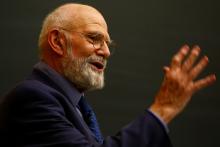
I remember the first time I saw the movie Awakenings. I was living at Jeff Street Baptist Center and working with a community of inner-city teenagers from the Clarksdale housing projects in Louisville, Ky.
Monday nights were Dollar Movie Nights for us and we would load up in our orange van (affectionately called The Great Pumpkin) and head out to the theater. On that Monday night I chose Awakenings as our movie of the week, hoping that my kids would identify with the 'helping each other overcome' theme in the story. My dream was deferred. They hated it!
Within 15 minutes of the start of the movie they were throwing popcorn at the screen. We got up and changed theaters to something faster paced with more action. I had to promise to check my movie choices with them before they agreed to go with me again.
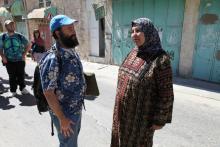
Over the past four years I have had the opportunity to spend a significant amount time in the Middle East. I no longer approach the time as a tourist, but instead seek out relationships and experiences as a listener who has much to learn about the way God is at work in contexts much different than my own. In that posture, it has been remarkable how much I have learned and begun to integrate into the way I live, love and lead back in my neighborhood. Theologian Paul Knitter describes it well when he refers to ones inherited worldview as a telescope.
"No matter how objective we may think we are or desire to be, we all see the world through a specific telescope/worldview. When we choose to look through the telescope of people who are “different” than us, we begin to get a more comprehensive picture of the world and the way God is at work within it."
Leading our first Learning Community to the Middle East apart of The Global Immersion Project I recently co-founded, I was invited to take a look through the lens of friends’ telescopes who live amid conflict in Israel and Palestine. Here are some of my key learnings:

HILDEGARD BLEW in on a late summer storm. Sleek and ebony, eyes a bright chatoyant gold. Between the Supercans and downed tree limbs, she was scratching up worms, plucking at bugs. In this nation’s capital of a little more than 600,000 souls, a loose hen was highly unusual—but there she was, in all her Gallus gallus domesticus glory.
Of course, she didn’t arrive with the name Hildegard. And certainly not Hildegard von Chicken, after a favorite Rhineland mystic. That came later. After she’d been interviewed and photographed for the DCist news blog; after she’d become a destination point for recently migrated hipsters; and after a woman running for local office asked if she could take Hildegard on the campaign stump to make her candidacy “more memorable.”
Hildegard received her name after a chance encounter with La Señora at the 11th street bus stop. “I rescued a chicken,” I told her. “What color?” she shot back.
La Señora is in her 70s and from Paraguay. She is knowledgeable about many things. “Black ... with a green undersheen,” I said. “This is very good. You have most likely rescued it from a religious ritual where it would be sacrificed for evil intentions.” “Wow!” I replied. “What should I do?” La Señora stared at me a moment: “You must pray the rosary with the chicken. Hold her and pray the rosary.”
THIS WAS THE series of curious events that led to my being perched on porch steps on a hill in the imperial city of Washington, D.C., holding my grandmother’s rosary and praying with a chicken, whose name I decided should be Hildegard, “Sybil of 11th Street,” because she was consulted by so many of high and low estate.
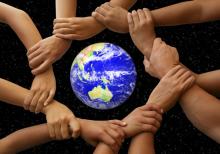
Just peace theory begins with the idea that peacemaking, peacekeeping, and peace building is a day-by-blessed-day proposition. Unlike just war theory, it does not begin when violent conflict is imminent. There are 10 just peacemaking practices that have a record of success. A just peace foreign policy employs these practices for the purposes of both national security and of international peace.
The 10 just peacemaking practices are: support nonviolent direct action; take independent initiatives to reduce threat; use cooperative conflict resolution; acknowledge responsibility for conflict and injustice, and seek repentance and forgiveness; advance democracy, human rights, and interdependence; foster just and sustainable economic development; work with emerging cooperative forces in the international system; strengthen the United Nations and international efforts for cooperation and human rights; reduce offensive weapons and weapons trade; encourage grassroots peacemaking groups and voluntary association. (Just Peacemaking: the new paradigm for the ethics of peace and war Glen H. Stassen editor)
Cooperation, interdependence, human rights, and democracy are important elements of just peacemaking practices. I say this is a power-with, not a power-over model of foreign policy. This is not a model of weakness, but one of strength. The strength comes from building relationships and partnerships with other nations on the basis of mutual respect.
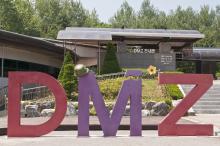
Recently, I had the opportunity to visit the DMZ (Demilitarized Zone) between the two Koreas along with a group of students and faculty from George Fox University. As the most fortified border on the entire planet, the DMZ contains an arsenal of tanks, land mines, watchtowers, razor wires, artillery, and nearly two million armed troops ready to face off within a moment’s notice. Former President Bill Clinton described the DMZ as the “scariest place on earth,” a description more eerie coming from one of the few people in history to have had direct access to the “button.”
While observing the various sites within the DMZ, I thought about how the pacifist Quakers, who founded my school in 1885, would have reacted to such an experience.
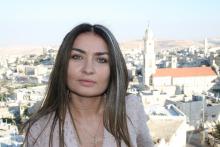
Bio: Catholic Palestinian film director and founder of the nonprofit Open Bethlehem. operationbethlehem.com
1. How did Open Bethlehem get started?
Growing up in Bethlehem, I always wanted to leave. I settled in London, but when events started becoming worse and worse in the region, I wanted to do something. So I went back and started working on a film. My cousin encouraged me and said, “Look at what’s happening to our city. Why don’t you do more than just a film?” And so together, in 2005, we started a campaign called Open Bethlehem.
2. What is its main goal?
The idea is to use Bethlehem as a doorway into the region. We created the Bethlehem Passport, which is like an honorary citizenship, inviting people to partake in the town that stands for joy and goodwill to all. The passport is an appeal to everybody to do something to help bring peace to the Middle East. We aim mostly at educating people abroad—policymakers, the media, and church leaders—about the plight of Bethlehem, its Christian community, and the diversity of the city.
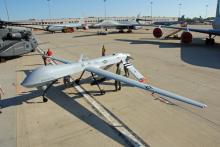
People of Jesus work against demons — against the forces of evil that eat away at the goodness of God, the wonder of creation, the life of God in the world. Demonic forces roam the world, corrupting minds and bodies, cultures and governments, trying to bring ruin upon all that is good and beautiful. They dehumanize, devastate, and destroy life.
Weaponized drones are demons: evil spirits of the air, specters in the heavens, shadowy presences. They are forces of evil in heavenly places, triggering mental anxiety and bodily harm, instigating psychological damage and death, raining down terror and trauma.

Editor's Note: The following is a transcript of President Barack Obama's remarks to the UN General Assembly in New York City on Tuesday, in which he condemns global violence and extremism, framing the speech around the recent tragedy at the U.S. consulate in Libya.
THE PRESIDENT: Mr. President, Mr. Secretary General, fellow delegates, ladies and gentleman: I would like to begin today by telling you about an American named Chris Stevens.
Chris was born in a town called Grass Valley, California, the son of a lawyer and a musician. As a young man, Chris joined the Peace Corps, and taught English in Morocco. And he came to love and respect the people of North Africa and the Middle East. He would carry that commitment throughout his life. As a diplomat, he worked from Egypt to Syria, from Saudi Arabia to Libya. He was known for walking the streets of the cities where he worked -- tasting the local food, meeting as many people as he could, speaking Arabic, listening with a broad smile.
Chris went to Benghazi in the early days of the Libyan revolution, arriving on a cargo ship. As America’s representative, he helped the Libyan people as they coped with violent conflict, cared for the wounded, and crafted a vision for the future in which the rights of all Libyans would be respected. And after the revolution, he supported the birth of a new democracy, as Libyans held elections, and built new institutions, and began to move forward after decades of dictatorship.
Chris Stevens loved his work. He took pride in the country he served, and he saw dignity in the people that he met. And two weeks ago, he traveled to Benghazi to review plans to establish a new cultural center and modernize a hospital. That’s when America’s compound came under attack. Along with three of his colleagues, Chris was killed in the city that he helped to save. He was 52 years old.

I just arrived in Tennessee for a little sabbatical in the hills where I grew up. As I settled into my old childhood room again for a week or so of rest, I noticed a pile of newspaper articles my mom placed by the toilet. She's gotten into the habit of putting clippings of articles there that she thinks I'll enjoy reading while having my special time in the bathroom.
One of the articles was an extraordinary front-page story in the Knoxville News Sentinel about three peace activists who shut down the Y-12 nuclear plant last month in Oak Ridge for more than weeks.
In the predawn hours of July 28, three unarmed peace activists entered the Y-12 nuclear plant and, over a matter of hours, made their unprecedented way through the layers of security to the very heart of the facility, where they performed a prayerful service, hung "crime-scene" tape and poured human blood as a symbol of the violence of nuclear weapons. One of the intruders was an 82-year-old nun who is now an international celebrity. It's a contemporary story of David and Goliath, the shepherd boy who took on a giant with nothing but a slingshot.
The article makes a spectacle of how these three folks, whose average age was 67, managed to mosey into one of the most highly secure and potentially deadly facilities in the world. But they chose the spot for a reason.
The Oak Ridge Y-12 plant was responsible for the explosives of the Hiroshima bomb. It has been called "the Fort Knox of Uranium." The Y-12 plant is the nation's primary supplier of bomb-grade uranium, and has played a role in the manufacture of every nuclear weapon in the U.S. arsenal, which now flaunts the capacity of more than 50,000 Hiroshima-size bombs.
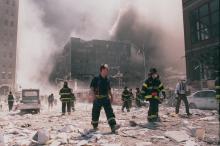
Good and gracious God,
Today we come before you with heavy hearts
as we remember the events of 9/11.
For some of us today is a mixed bag of emotions.
We hurt deeply for those who lost their lives
and those who lost their loved ones.
We mourn the nearly 3000 who died that day.
We are humbled by the bravery of the first responders.
We continue to grieve with our neighbors
in the loss of our national innocence -
our false sense of constant safety.